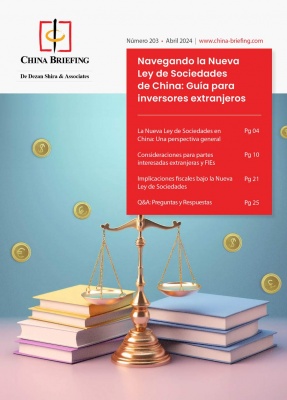China Budgeting Issues for 2014
HR costs and receivables need attention when planning next year’s operating costs
Op-Ed Commentary: Chris Devonshire-Ellis
Dec 13 – In this article, we examine some of the principal cost issues likely to affect foreign investors in China as we get into China budget preparations for 2014 .
Salaries
China’s increasing labor costs have been well documented, but even today are often not fully appreciated for the total impact they are causing as business expense. China has been raising its minimum wage at a rate of between 15-20 percent per annum for the past few years, and this is set to continue. How much this is increased by is determined at the local government level, and thus changes from city to city. We have regularly run updates on China’s labor costs on China Briefing. It can be argued that increases in the minimum wage impact upon low level workers only; however, the reality is that workers across the shop floor at all levels demand similar increases as a result of this. It also impacts upon service staff – in fact, all Chinese employees will be looking for increases of 20% and even more for 2014. How this is dealt with is an HR matter and full attention needs to be paid to this to keep these increases manageable and justified. Individuals should be rewarded for good work, and the practice of just increasing wages at all levels across-the-board is discouraged.
Welfare
In terms of welfare, this expense is linked to the salary as a percentage. This also varies from city to city in terms of the amounts due, and in some cases the actual welfare funds that need to be contributed too. Nonetheless, the average percentage of welfare against salary is between 40-50%. This is in addition to the salary amount and as such is a major expense. Our most recent data on social welfare payments applicable in China can be found here.
Related HR Costs
A tightening of China’s labor laws and the large amounts that employees can obtain from their employer under these laws has lead to a rash of unscrupulous employees seeking awards against their employer. In one such case we dealt with this year, the employee resigned to join another company, but six months later issued a writ for substantial damages relating to an illness he alleged had been caused by working at the previous employer. The case went to court, then to appeal and then to final appeal. Each time the employee lost. Finally, he took to protesting outside the local government offices – whereupon the City Mayor instructed the employer to pay anyway to cease the “political embarrassment caused”. In short, despite winning three hearings, the employer had to pay. We advise building in contingency funds for litigation in China relating to HR issues and see this type of conflict as an increasing trend – and especially as China’s pollution problems have worsened. It will only be a matter of time before a class action lawsuit is issued against an employer to extract money from them under the auspices of a polluted work environment – including the air quality. It is one of the ways in which the Chinese government can defray blame and medical costs. Be prepared for such events to be on the increase, assess the risk and place some contingency funds in position just in case. In the meantime, it pays to properly assess the validity of your labor contract with each employee. We discussed the optimum drafting of labor contracts earlier this year here.
Office Rental
As property prices increase in China, so are rentals. Although there are signs that good quality lessors with a track record of paying in full and on time, or those with prestigious names are subject to less increases than new-to-China businesses who represent more risk. We are aware of some SME’s in Shanghai whose rental in Grade A buildings went up by just 10 percent when all offices around increased by 40 per cent. The lesson is it pays to be a good tenant. Even so, rental costs are rising fast in China.
Receivables & Bad Debt
Poor trading conditions have meant that, for many companies in China, receivables have increased – leading to cash flow stretching – and bad debts have also risen. We do not feel this situation will improve during 2014. Accordingly, it makes sense to encourage staff to chase those receivables up and bring those numbers down. Many foreign businessmen in China may not be aware the Chinese New Year – which this year falls at the end of January – is supposed to be a time for paying off debts. Having them carry forward into the next year is bad luck. This means that now is a prime time to get your sales force or accounts department on the case to bring those receivables down. In terms of bad debt, write it off and start afresh – and expect more of the same against 2014 sales figures.
Intangibles
The problem with all emerging markets – and China is certainly no exception – are the intangibles. These can range from Hainan spy plane incidents, which are in reality low-impact affairs – to the waging of full scale political trade issues, which can cause immense damage to specific targets. Japan is one example and the Philippines may well be the next. The Japanese have largely reacted by seeking to develop trade links elsewhere and no longer view China as a “friendly” investment destination. China has not been shy of using trade to impose its displeasure, albeit these risks are well known. More damaging still are potential problems with disease. China has already given us Bird Flu and SARS, and when, rather than if, another outbreak of a virulent communicable disease comes to pass it could cause serious damage in China and to investors in the country. Add to this the now heavily polluted major cities – none have been exempted – and it is apparent China could at any moment rapidly degenerate. Foreign investment would dry up in a matter of weeks and people would leave. Factories and even entire cities could go into lock down. It may sound dramatic, but this is exactly what happened during SARS. The only solution here is to have enough operating costs on hand to keep a business going during such a period. We would recommend four-six months banked and readily available as an ideal buffer.
Getting China budgets right is only a guessing game as so many things can go wrong. 2014 may not bring much improvement to the overall business environment and China is overdue one of its periodic crises. Nonetheless, getting tight with labor contracts, examining these properly as an HR issue and paying attention to staff costs continues to be a major target for examining costs in 2014 budgets. It also pays to be aware of cash flow problems caused by receivables and the occasional bad debt. Prudence should be the watch word for 2014, and, if possible, retention of some profits within the business to boost cash reserves.
Chris Devonshire-Ellis is the Founding Partner of Dezan Shira & Associates – a specialist foreign direct investment practice providing corporate establishment, business advisory, tax advisory and compliance, accounting, payroll, due diligence and financial review services to multinationals investing in emerging Asia. Since its establishment in 1992, the firm has grown into one of Asia’s most versatile full-service consultancies with operational offices across China, Hong Kong, India, Singapore and Vietnam as well as liaison offices in Italy and the United States.
For further details or to contact the firm, please email china@dezshira.com, visit www.dezshira.com, or download the company brochure.
You can stay up to date with the latest business and investment trends across Asia by subscribing to Asia Briefing’s complimentary update service featuring news, commentary, guides, and multimedia resources.
Related Reading
 Social Insurance in China: In this issue of China Briefing Magazine, we introduce China’s current social insurance system and provide an update on the status of foreigners’ participation in the system. We also include a comprehensive chart of updated average wages across China, which is used to calculate social insurance contribution floors and ceilings.
Social Insurance in China: In this issue of China Briefing Magazine, we introduce China’s current social insurance system and provide an update on the status of foreigners’ participation in the system. We also include a comprehensive chart of updated average wages across China, which is used to calculate social insurance contribution floors and ceilings.
China Revises Labor Contract Law
Mandatory Social Welfare for Chinese Employees
- Previous Article China Briefing Online Passes The One Million Views Barrier
- Next Article China To Abolish Hukou System
























